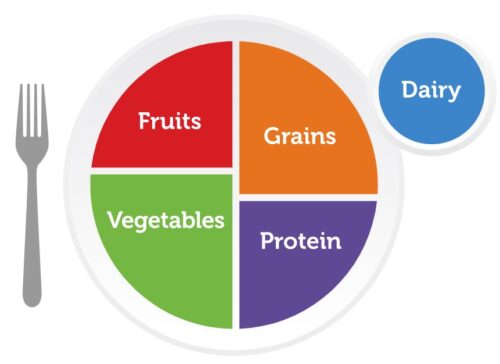The 2020-2025 Dietary Guidelines for Americans emphasizes the importance of creating a healthy eating pattern to maintain health and reduce the risk of disease. Poor nutrition is linked to diabetes, cardiovascular disease, cancer, osteoporosis and dental disease.
Everything we eat and drink—the food and beverage choices we make day to day and over our lifetime—matters. Eating healthy is a journey shaped by many factors, including our stage of life, situations, preferences, access to food, culture, traditions and the personal decisions we make over time. To help Americans lead healthy lifestyles, the U.S. Department of Agriculture has adopted MyPlate, which focuses on the five food groups (fruits, vegetables, grains, dairy, and protein) that are the building blocks for a healthy diet. Before you eat, think about what goes on your plate, in your bowl or in your cup.
Build a healthy eating style
Focus on variety, amount and nutrition
- Choose healthy food and beverages from all five food groups, including fruits, vegetables, grains, protein foods, and dairy to get the nutrients you need.
- Eat the right amount of calories based on your age, sex, height, weight and physical activity level.
- Building a healthier eating style can help you avoid overweight and obesity and reduce your risk of diseases such as heart disease, diabetes and cancer.
Choose an eating style low in saturated fat, sodium and added sugars.
- Use Nutrition Facts labels and ingredient lists to find amounts of saturated fat, sodium and added sugars in the foods and beverages you choose.
- Look for food and drink choices that are lower in saturated fat, sodium and added sugar.
Make small changes to create a healthier eating style.
- Start with a few small changes.
- Make half your plate fruits and vegetables.
- Make half your grains whole grains.
- Move to low-fat or fat-free milk or yogurt.
- Eat a variety of proteins to keep you satisfied. Meat, poultry, seafood, beans and peas, eggs, processed soy products, nuts and seeds are considered proteins.
Exercise
Exercise is an integral part of good health. Being active has been shown to have many health benefits, both physically and mentally. It may even help you live longer. It is recommended that adults get 150 to 300 minutes of moderate-intensity activity a week to prevent weight gain and stay healthy. This includes fast walking, bicycling, vigorous dancing and swimming. In general, try to accumulate about 30 minutes of physical activity a day, five days a week. It is more important that you have shorter intervals of exercise and continue with your exercise regimen than have one or two long sessions per week. Getting shorter bursts of exercise may be as, if not more beneficial than longer, sustained periods of time.
For those who aren’t accustomed to physical activity, initial activities may be light and at a slow pace. Though an individual’s regimen can be adapted to other forms of physical activity, walking is a particularly smart choice because of its safety and accessibility.
Increase activity by undertaking frequent, less strenuous exercises, such as walking up and down the stairs instead of using the elevator. Once some progress has been made, many find they are eventually able to engage in more strenuous activities such as tennis or any form of group sport. To stay motivated, choose activities that are fun, set realistic goals and celebrate your progress. Exercise with a friend to make it more pleasurable or keep a journal/download an app to track your progress.
Benefits
Exercising regularly:
- Can improve your mood and reduce feelings of anxiety and depression
- Supports a fast metabolism, burns more calories per day, maintains your muscle mass and weight loss, and helps prevent osteoporosis.
- Can help with maintaining a healthy weight and reducing the risk of chronic disease
- Can provide antioxidant protection and promote blood flow, which can protect your skin and delay signs of aging
- Improves blood flow to the brain and helps brain health and memory
- Can help you sleep better and feel more energized during the day
- Has favorable effects on the pain associated with various conditions.
- Can help improve sexual desire, improve function and performance and decreases risk of erectile dysfunction in men.
When to see your Doctor
Talk to your health care provider about the best exercise and fitness options for you based on your age, lifestyle and health history.

